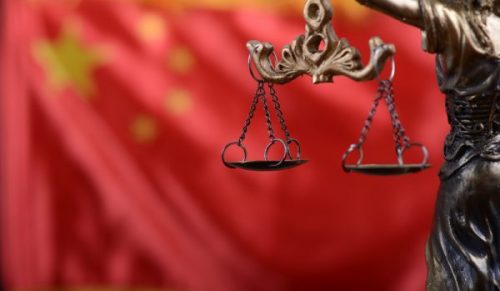
In a significant move aimed at curbing anti-competitive practices, China issued new anti-monopoly guidelines on Friday, emphasizing that industry associations must refrain from organizing firms into engaging in monopoly agreements.
The guidelines further instruct these associations to guide their members in strengthening antitrust compliance, as reported by state media CCTV.
Simultaneously, China’s Jiangsu Province has taken a crucial step in protecting trade secrets by releasing the first-ever “Guidelines for Handling Criminal Cases of Infringing upon Trade Secrets.” The announcement, made on January 8, marks a substantial development in addressing the escalating incidents of trade secret infringement, particularly triggered by employee turnover.
Currently, China’s legislation pertaining to the protection of trade secrets is confined to Article 9 of the “Anti-Unfair Competition Law” and Article 219 of the “Criminal Law.” However, the newly introduced “Guidelines” aim to provide comprehensive and explicit directives for handling criminal cases related to trade secret infringement.
Read more: An Introduction to China’s Anti-Monopoly Law
The release of these guidelines is timely, given the rising challenges and controversies associated with trade secret infringement cases. Notably, incidents linked to employee turnover have been on the upswing, making it imperative for the legal framework to adapt to these evolving circumstances.
The “Guidelines” address these concerns by outlining the overall requirements for handling criminal cases of trade secret infringement. Key aspects covered include the nature of trade secrets, acts constituting trade secret infringement, criteria for determining the severity of circumstances, and considerations for joint criminal activities. The document also specifies methods for ascertaining technical facts, appraisal procedures, and associated requirements.
The proactive stance of the “Guidelines” reflects a commitment to keeping pace with the latest developments in handling criminal cases related to trade secret infringement. By providing clear definitions and guidelines, the document is poised to significantly enhance the legal framework for safeguarding intellectual property rights in China.
Source: Reuters
Featured News
Big Tech Braces for Potential Changes Under a Second Trump Presidency
Nov 6, 2024 by
CPI
Trump’s Potential Shift in US Antitrust Policy Raises Questions for Big Tech and Mergers
Nov 6, 2024 by
CPI
EU Set to Fine Apple in First Major Enforcement of Digital Markets Act
Nov 5, 2024 by
CPI
Six Indicted in Federal Bid-Rigging Schemes Involving Government IT Contracts
Nov 5, 2024 by
CPI
Ireland Secures First €3 Billion Apple Tax Payment, Boosting Exchequer Funds
Nov 5, 2024 by
CPI
Antitrust Mix by CPI
Antitrust Chronicle® – Remedies Revisited
Oct 30, 2024 by
CPI
Fixing the Fix: Updating Policy on Merger Remedies
Oct 30, 2024 by
CPI
Methodology Matters: The 2017 FTC Remedies Study
Oct 30, 2024 by
CPI
U.S. v. AT&T: Five Lessons for Vertical Merger Enforcement
Oct 30, 2024 by
CPI
The Search for Antitrust Remedies in Tech Leads Beyond Antitrust
Oct 30, 2024 by
CPI